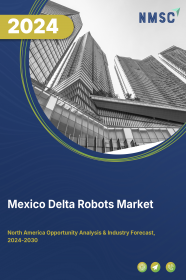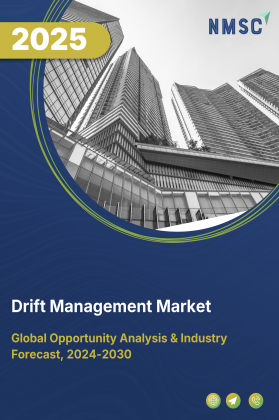
Mexico Delta Robots Market by Axis Type (Double Axis, Three Axis, Four Axis, Five Axis, and Six Axis), by Payload Capacity (Up to 3 Kilogram, 3.1 to 8 Kilogram, 8.1 to 15 Kilogram, and More than 15 Kilogram), by Version Environment (Standard and Hygiene), by Application (Assembly, Pick & Place, Material Handling, Palletizing/Packaging, and Others), by Industry Vertical (Electronics, Cosmetics, Food & Beverages, Pharmaceuticals, and Others) – Opportunity Analysis and Industry Forecast, 2023–2030
Industry: ICT & Media | Publish Date: 02-Dec-2024 | No of Pages: 75 | No. of Tables: 59 | No. of Figures: 28 | Format: PDF | Report Code : IC894
Market Definition
Mexico Delta Robots Market was valued at USD 42.8 million in 2022, and is predicted to reach USD 145.25 million by 2030, with a CAGR of 15.49% from 2023 to 2030. Delta or parallel robots are highly specialized robotic systems characterized by their unique mechanical structure and exceptional precision. These robots have three or more arms connected to a common base, forming a parallel mechanism that gives exceptional precision and structural stability.
Delta robots are renowned for their remarkable speed, agility, and accuracy, making them ideal for a wide range of high-speed, precision applications in manufacturing, electronics, food & beverage, pharmaceuticals, and others. The design of delta robots allows them to move with incredible precision in all three dimensions, such as assembly lines, pick-and-place operations, and intricate manufacturing processes. Making them particularly well-suited for tasks involving pick and place, assembly, packaging, and material handling.
Their parallel kinematic structure, a robotic system design where multiple limbs work parallel to control end-effector motion, enabling precise coordination and control, provides superior rigidity and stability, ensuring consistent and reliable performance. Depending on their specific configuration, they can handle various payloads, ranging from lightweight items to heavier components.
Thus, delta robots are a class of robotic systems renowned for their speed, precision, and versatility. Their unique parallel structure, including rigidity, speed, and stability, makes them a preferred choice for various high-speed automation tasks across multiple industries, contributing to increased efficiency and precision in modern manufacturing and assembly processes.
Mexican Government Promotes Robotics and Automation in Manufacturing for Economic Competitiveness
The Mexican Government is actively promoting automation technologies, including robotics, in manufacturing industries, including medical devices and automotive, to improve the country's economic competitiveness. For instance, in November 2021, the partnership between the Mexican Ministry of Foreign Affairs, UNIDO, and UN-Habitat on the "Prospective Territorial-Industrial Atlas for the Attraction of Investments" was introduced by the Minister of Foreign Affairs to serve as a tool for the nation's economic restoration.
This initiative takes a novel approach to boosting investments by focusing on significant manufacturing sectors, including medical devices and others, that have the potential to attract investment and thereby advance Mexico's economic and urban development. Thus, all these factors impact the growth of the market.
Delta Robots Mitigate Labor Shortages and Ensure Consistent Production in Mexico
Mexico, like numerous other nations, grapples with labor shortages, particularly in specific industries. This scarcity of skilled labor can hinder production processes and compromise consistency in manufacturing. Delta robots offer a compelling solution by decreasing reliance on manual labor.
These highly automated machines excel in performing precise, repetitive tasks swiftly and accurately, thereby mitigating the impact of labor shortages. By seamlessly integrating into production lines, delta robots not only maintain consistent output but also enhance efficiency, ensuring that industries in Mexico can meet their production demands while navigating labor challenges. Thus, this is expected to drive the growth of the market within the country.
The High Cost of Delta Robots Hinders Market Growth in Mexico
The high cost of delta robots presents a substantial restraint on the market's growth. These robots, known for their precision and efficiency, often come with a price tag that can be a barrier to adoption for many businesses, particularly small and medium-sized enterprises (SMEs).
Additionally, the extended return on investment (ROI) period due to high upfront costs can deter companies seeking more immediate cost savings and efficiency improvements. This situation hinders market growth and contributes to market concentration, with only larger corporations able to afford and benefit from this advanced automation technology.
Integration of Advanced Technologies to Enhance Precision represents a significant opportunity for the Market
Integrating advanced technologies, such as computer vision and artificial intelligence (AI), to enhance precision represents a significant opportunity for the delta robot market. These cutting-edge technologies enable delta robots to operate more accurately and efficiently, opening up new avenues for applications across various industries.
The integration of computer vision and AI not only enhances precision but also improves overall productivity and reduces errors in manufacturing processes. This can result in cost savings, higher product quality, and increased competitiveness for businesses that leverage delta robots with these advanced technologies. As industries continue to embrace automation and demand higher precision and flexibility, the delta robot market is poised to benefit significantly from the opportunities created by integrating computer vision and AI.
Competitive Landscape
The Mexico Delta Robots industry includes several market players such as ABB Ltd., Fanuc Corporation, Kawasaki Heavy Industries Ltd, Yaskawa Electric Corporation, FESTO, Weiss GmbH, Omron Corporation, IGUS GmbH, Cama Group, and KUKA AG.
Key Benefits
-
The Mexico Delta Robots market report provides a quantitative analysis of the current market and estimations through 2023-2030 that assists in identifying the prevailing market opportunities to capitalize on.
-
The study comprises a deep dive analysis of the market trend including the current and future trends for depicting the prevalent investment pockets in the market.
-
The information related to key drivers, restraints, and opportunities and their impact on the market is provided in the report.
-
The competitive analysis of the market players along with their market share in the Mexico Delta Robots market.
-
The SWOT analysis and Porter’s Five Forces model are elaborated in the study.
-
Value chain analysis in the market study provides a clear picture of the stakeholders’ roles.
Mexico Delta Robots Market Key Segments
By Axis Type
-
Double Axis
-
Three Axis
-
Four Axis
-
Five Axis
-
Six Axis
By Payload Capacity
-
Upto 3 Kilogram
-
3.1 to 8 Kilogram
-
8.1 to 15 Kilogram
-
More than 15 Kilogram
By Version Environment
-
Standard
-
Hygiene
By Application
-
Assembly
-
Pick & Place
-
Material handling
-
Palletizing/ Packaging
-
Primary
-
Secondary
-
-
Others
By Industry Vertical
-
Electronics
-
Cosmetics
-
Food & Beverages
-
Pharmaceuticals
-
Others
Key Players
-
ABB Ltd.
-
Fanuc Corporation
-
Kawasaki Heavy Industries Ltd.
-
Yaskawa Electric Corporation
-
FESTO
-
Weiss GmbH
-
Omron Corporation
-
IGUS GmbH
-
Cama Group
-
KUKA AG
REPORT SCOPE AND SEGMENTATION:
|
Parameters |
Details |
|
Market Size in 2022 |
USD 42.8 Million |
|
Market Volume in 2022 |
2452 Units |
|
Revenue Forecast in 2030 |
USD 145.25 Million |
|
Growth Rate |
CAGR of 15.49% from 2023 to 2030 |
|
Analysis Period |
2022–2030 |
|
Base Year Considered |
2022 |
|
Forecast Period |
2023–2030 |
|
Market Size Estimation |
Million (USD) |
|
Growth Factors |
The increasing government initiatives. Growing labor shortages. |
|
Companies Profiled |
10 |
|
Market Share |
Available for 10 companies |
|
Customization Scope |
Free customization (equivalent up to 80 working hours of analysts) after purchase. Addition or alteration to country, regional, and segment scope. |
|
Pricing and Purchase Options |
Avail customized purchase options to meet your exact research needs. |




















 Speak to Our Analyst
Speak to Our Analyst

























